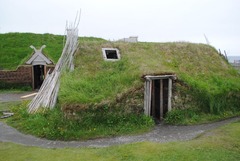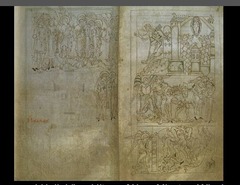HIST 108: Early Medieval History – Flashcards
Unlock all answers in this set
Unlock answersquestion
Main contours of Roman life in late antiquity
answer
1. Urban-based civilization: civilitas as an ideal 2: Symbolic importance of Rome as a city 3: Appeal of Romanitas to provincial elites 4: the emperor as ruler and 'glue' of the Empire 5: Joined-up world 6: apparatus of state power 7: taxation buys a large military apparatus
question
civilitas
answer
"Civilization-ness". The ideal of being civilized vs. barbaric.
question
annona
answer
regular food shipments to population
question
Romanitas
answer
"Roman-ness" the culture of being Roman
question
Trier
answer
German town- Porta Nigra Roman-era gatehouse located here
question
Limes
answer
System of forts along Roman frontier borders
question
Constantinople
answer
Capitol of the Eastern Roman Empire
question
Fishbourne
answer
Town in southern England. Roman-style villa located here, represents local elite's desire to appear Roman.
question
Silchester
answer
Town in England, Roman town near here (Calleva Atrebatum)
question
Anicii
answer
Possibly the richest family of all time (Roman elites)
question
Edict of Milan
answer
313- Toleration of all religions (esp. Christianity)
question
Nero
answer
Roman Emperor (duh), persecuted Christians in the 60s AD
question
Diocletian
answer
Roman Emperor, persecuted Christians in the early 300s AD
question
Mithras
answer
Roman cult deity- similarities to Christianity. Popular in military, so Christianity piggybacked off of it and spread through the empire.
question
Maxentius
answer
Rival of Constantine. Defeated at Milvian Bridge
question
Milvian Bridge
answer
312- Battle between Constantine vs. Maxentius for control of Rome. Constantine attributes victory to divine intervention by Christian God, converts.
question
labarum
answer
Military standard bearing the "Chi-Rho" (early Christian symbol, first two letters of "Christ" in Greek. Constantine attributed his victory at Milvian Bridge to these banners.
question
Nicaea
answer
Anatolian town, home of the Nicene Creed
question
Nicene Creed
answer
Early Byzantine Christian declaration of faith
question
Hypatia
answer
Egyptian intellectual, scientist, philosopher from Alexandria. She was murdered by mob of Christians for being a pagan.
question
Theodosius I
answer
392- bans paganism in the the Empire
question
Alexandria
answer
Previously major center of learning and intellectualism (library of Alexandria). Major conflict between Christians/Jews/Pagans. Murder of Hypatia.
question
paganus
answer
"villager" refers to common provincial people. "Pagan" derived from this.
question
Labarum motif (image)
answer
The Chi-Rho
question
Ethnogenesis
answer
People are processes, not fixed things. The Visigoths and the Saxons didn't "come from" anywhere, they developed as they moved.
question
Edward Gibbon
answer
18th century English historian. Wrote "The History of the Decline and Fall of the Roman Empire"
question
Romaioi
answer
"Romans" - Byzantines referred to themselves as a continuation of the Roman empire, not a separate empire.
question
Constantine XI Palaeologus
answer
Last Byzantine/Roman emperor. d.1453
question
Arminius
answer
Germanic chieftain, former Roman officer. Defeated three Roman legions in battle.
question
Tacitus
answer
Roman historian. Wrote "Germania"
question
Germania
answer
Written by Tacitus, describes the noble savages of Germany. Not particularly accurate, but.
question
Childeric's Ring (image)
answer
THIS BITCH: : It's fine I don't really need to study it cuz it says "Childeric" on it lolll
question
Merovingians
answer
Frankish dynasty
question
Childeric I
answer
Founder of the Merovingian dynasty. Famous burial, grave goods, ring. Father of Clovis I.
question
Clovis I
answer
Son of Childeric I. United all Frankish people. Famously converted to Christianity.
question
Tournai
answer
Town in Belgium. Burial of Childeric, birthplace of Clovis.
question
episcopus
answer
Bishop that governs a diocese
question
see
answer
Area of a bishop's jurisdiction
question
diocese
answer
Territorial unit of administration in the Church.
question
duces
answer
Saxon chiefs "leaders"
question
leudes
answer
Saxon warriors "followers". Loyalty is bought, not inherent.
question
Fredegund
answer
First wife of Childeric. Ordered tons of assassinations, probably personally strangled Childeric's second wife to death, possibly assassinated Childeric himself.
question
Brunhildis
answer
Wife of Childeric's son Merovech. Sister of Childeric's second wife that Fredegund killed.
question
reges criniti
answer
"Long-haired kings"- Merovingians
question
Gregory of Tours
answer
Medieval historian. Wrote "History of the Franks"
question
Bede
answer
English historian. Wrote "Ecclesiastical History of the English People"
question
Wearmouth/Jarrow
answer
Towns near the Monkwearmouth-Jarrow Abbey, where Bede served.
question
Northumbria
answer
Most northerly of the English kingdoms. Suffered from Viking raids and was eventually taken over by Vikings.
question
Sutton Hoo
answer
Major Saxon burial site. Possibly the resting place of Raedwald.
question
Deben
answer
A river in Suffolk? Um..?
question
Rendlesham
answer
Anglo-Saxon palace near Sutton Hoo.
question
Raedwald
answer
King of East Anglia. Probably buried at Sutton Hoo.
question
monos
answer
"solitary"- monastery, monk
question
eremos
answer
"desert"- arid
question
ascesis
answer
severe self-discipline; asceticism- abstinence from worldly pleasure
question
koinos
answer
"common"- coenobium (monastery)
question
laura
answer
"loose assemblage along a path"
question
Athanasius
answer
Bishop of Alexandria. Big problems with Arianism.
question
Pachomius
answer
Hermit monk. Established monastery at Tabennisi.
question
Tabennisi
answer
Desert monastery in Egypt. Established by Pachomius.
question
St. Simeon Stylite
answer
This boi sat on a pillar for 37 years cuz "aesthetic". Well, ascetic, actually.
question
Hajj
answer
Islamic pilgrimage to Mecca.
question
virtus
answer
"valor" "courage"
question
Holy Sepulchre
answer
Important church in Jerusalem.
question
Bordeaux Pilgrimage
answer
Pilgrimage from Bordeaux, France to Jerusalem.
question
Egeria
answer
380s, wrote an account of her pilgrimage to the Holy Land.
question
St. Helena (image)
answer
Found the True Cross, supposedly. Featured in Italian manuscript that Quizlet won't let me upload.
question
Sulpicious Severus
answer
Christian writer, historian (Benedictine era)
question
Nursia
answer
Benedict's hometown
question
Ostrogoths
answer
Germanic kingdom
question
Justinian
answer
Byzantine Emperor. Really keen on retaking Rome.
question
gyrovagi
answer
wandering monks
question
Hagia Sophia
answer
Byzantine Christian mega-church.
question
Christological debates
answer
Wait, what the **** is a Jesus? Is this boy divine? Is he just a prophet? What's our entire religion's foundation based on again? I can't figure it out.
question
Heraclius
answer
Byzantine Emperor. Made Greek the official language. Defeated Sassanids..
question
Khusro II
answer
Last king of the Sassanid Empire. Defeated by Heraclius.
question
Sassanid Empire
answer
Persian Empire. Rival of Byzantines.
question
Ctesiphon
answer
Capitol of the Sassanids.
question
Mohammed
answer
Founder of Islam. duh.
question
Mecca
answer
Islamic holy city. Hajj destination.
question
Quraysh
answer
Mohammed's tribe.
question
Qu'ran
answer
Islamic holy book
question
Medina
answer
Islamic holy city
question
caliph
answer
chief Muslim civil and religious ruler, regarded as the successor of Muhammad
question
Zoroastrianism
answer
Persian religion. Emphasis on dualism, good vs. evil.
question
Francia
answer
Germanic kingdom of the Franks, predecessor to France.
question
Arianism
answer
Christian school of thought that sees Christ as distinct from God the Father. He is not God, only the son of God.
question
Arnulfings
answer
Also known as Pippinids, dynasty of de facto Frankish rulers (Merovingians held "king" title, but Arnulfings held the real control). Ended with Charles Martel, who formed the Carolingians.
question
Charles Martel
answer
THE HAMMER. Defeated Muslim army at Battle of Tours, formed Carolingian dynasty. Grandfather of Charlemagne.
question
Pippin the Short
answer
Son of Charles Martel, father of Charlemagne.
question
Poitiers
answer
French town near where the Battle of Tours was fought.
question
Carolingians
answer
Frankish dynasty that succeeded Merovingians. Founded by Charles Martel.
question
Charlemagne
answer
Grandson of Charles Martel. Most powerful Carolingian ruler. Expanded empire massively, defeated Lombards, Avars, more.
question
Marchfield
answer
Annual meeting to decide where the Carolingian war machine should go destroy.
question
Pavia
answer
Lombard capitol
question
Desiderius
answer
King of the Lombards
question
Irminsul
answer
Sacred pillar in Germanic Saxon paganism.
question
Avars
answer
Wealthy Caucasus kingdom. Charlemagne broke through the "Avar Ring" of fortifications and plundered massive amounts of gold.
question
Carolingian Soldiers in the St. Gallen Golden Psalter (image)
answer
http://manuscriptminiatures.com/media/manuscriptminiatures.com/original/1076-4.jpg
question
nimbus
answer
Halo around head featured in Byzantine art. Signifies holiness.
question
chlamys
answer
Fancy cape/robe. Worn by elites, emperors.
question
Theodora
answer
Wife of Justinian
question
Donation of Constantine
answer
Forged decree in which Constantine supposedly transferred power of the Western Roman Empire to the Pope. Although fake, the lie was believed by many in the 4th century and beyond. Gave church legitimacy, additional power.
question
missi dominici
answer
Local imperial Frankish supervisors
question
capitulary
answer
Royal ordinance
question
Aachen
answer
Charlemagne's capitol
question
Suetonius
answer
Roman historian
question
Einhard
answer
Frankish scholar. Wrote "Life of Charlemagne"
question
Annals of Fulda
answer
Tales about the lives of common people
question
Fraxinet
answer
Muslim fortress in southern France
question
Magyars
answer
Eastern European nomadic raiders
question
Lechfeld
answer
955- Otto I defeats Magyars
question
Harald Bluetooth
answer
Danish king. Commissioned Jelling stones be carved. Modern-day Bluetooth technology is named after him (Bluetooth symbol is H + B runes combined)
question
Lindisfarne
answer
Christian monastery raided by Vikings in 793. One of the earliest Viking raids in England.
question
Rus
answer
Norse people that migrated to Eastern Europe
question
Kiev
answer
Capitol of Rus people
question
Encomium Emmae
answer
11th-century Latin encomium in honor of Queen Emma of Normandy.
question
Vinland
answer
"Vineland" Americas, probably somewhere in Newfoundland.
question
L'Anse aux Meadows (image)

answer
Viking site in Newfoundland
question
Skraelings
answer
Viking name for Native Americans
question
Erik the Red
answer
Norse explorer, founded Greenland settlement.
question
Leif Erikson
answer
Norse explorer, discovered North America
question
Gudrid and her son Snorri (image)
answer
https://upload.wikimedia.org/wikipedia/commons/4/42/GudridAndSnorri.jpg
question
Coronation of Charlemagne
answer
Christmas Day, 800
question
Annals of Xanten
answer
Manuscript from Xanten Abbey on the Rhine
question
Odo
answer
Count of Paris, defended against invading Viking force in 885. Siege of Paris ended when Charles the Fat's army broke Viking line.
question
Treaty of Verdun
answer
843: Divided Carolingian Empire into three parts following death of Louis the Pious. Lothar I (middle), Louis the German (east), and Charles the Bald (west).
question
Battle of Fontenoy
answer
841: Major victory for Charles and Louis against Lothar in Carolingian Civil War.
question
Strasbourg Oaths
answer
Mutual pledges of allegiance between Louis the German and Charles the Bald.
question
Nithard
answer
Frankish historian
question
Louis the Pious (image)
answer
https://upload.wikimedia.org/wikipedia/commons/1/1a/Ludwik_I_Pobo%C5%BCny.jpg
question
Alcuin of York
answer
8th century English scholar
question
Caroline minuscule
answer
Font that was easier to read than previous, shittier, scripts.
question
Bernard of Septimania
answer
9th century Frankish duke
question
Visigoths
answer
Germanic kingdom
question
Wessex
answer
English kingdom. Under Alfred the Great, was the last and only English kingdom to withstand the Viking invasions of the 9th century.
question
burhs
answer
System of fortified towns established by Alfred the Great to withstand invasions and quickly muster armies.
question
Guthrum
answer
Danish leader during Viking invasions of Britain in the 9th century. Converted to Christianity after defeat to Alfred.
question
Danelaw
answer
Area of Britain ruled by the Danes in the 9th century.
question
aestel
answer
Decorative tip to a pointer (as would be used by a teacher). Many commissioned by Alfred the Great.
question
Benedict of Aniane
answer
The "Second Benedict". Reformed Benedictine Rule, served under Louis the Pious.
question
Cluny (image)
answer
French Abbey, founded by William I of Aquitane.
question
William I of Aquitane
answer
Founded Cluny Abbey
question
Uzerche (image)
answer
https://upload.wikimedia.org/wikipedia/commons/a/ab/Abbatiale_St_Pierre_Uzerche.JPG
question
A Liber Vitae (image)

answer
Name roster of visitors to the church
question
Berno
answer
First abbot of Cluny
question
Conques (image)
answer
French home of St. Faith
question
Cançó de Santa Fe
answer
Poem about St. Faith. Earliest known poem in the Old Occitan catalan language.
question
furtum sacrum
answer
"Holy theft" stealing relics is OK if the previous owners weren't worthy.
question
Ungari
answer
German name for the Magyars. Evolves into "Hungary" we know today.
question
stem duchy
answer
Local states within the post-Carolingian German kingdoms that retained pre-Carolingian tribal identities.
question
Vajk (Stephen I)
answer
Pagan Hungarian leader, converted to Christianity and became first King of Hungary.
question
fisc
answer
public treasury of Rome
question
Widukind
answer
Saxon leader. Rival of Charlemagne during Saxon Wars. 8th century.
question
Henry the Fowler
answer
Established Ottonian dynasty in East Francia.
question
Quedlinburg (image)
answer
http://www.wyndhamgardenquedlinburg.com/wyndham/garden-quedlinburg/reisetipps/quedlinburg-schloss.jpg
question
Berengar I
answer
Last Italian Holy Roman Emperor before Otto the Great.
question
Liudprand of Cremona
answer
Wrote "Relatio de Legatione Constantinopolitana" about his emissary position to the Byzantines (on behalf of the Ottonian Holy Roman Empire). Very colorful in his hostile depictions of the Byzantines.
question
Nicephoras Phocas
answer
10th century Byzantine Emperor, received Liudprand, was insulted by his constant assholery. Failed to find a wife for Otto II.
question
Theophanu
answer
Granddaughter of Emperor John I Tzimiskes (who succeeded Nicephoras Phocas and married his wife, who might have poisoned him, oh shit). Married Otto III, secured some peace between Ottonians and Byzantines.
question
Gerbert of Aurillac (Pope Sylvester II)
answer
Close ties with the Ottonians. Taught Otto II, III.
question
Sclavini
answer
Slavic raiders that attacked Byzantine Empire.
question
Thietmar of Merseburg
answer
Historian, chronicled histories of German Kings, Holy Roman Emperors.
question
Charles the Bald (image)
answer
https://upload.wikimedia.org/wikipedia/commons/thumb/5/50/Carlo_calvo.jpg/220px-Carlo_calvo.jpg
question
Annals of Saint-Bertin
answer
9th century Frankish annals, detail Scandinavian raids, the Rus.
question
castellan
answer
Governor of a castle
question
bannum
answer
rights of justice, minting, control of local levies, tolls, use of forced labor
question
Peyrusse-le-Roc (image)
answer
http://www.france-voyage.com/visuals/photos/peyrusse-roc-24669_w600.jpg
question
Lothar, penultimate Carolingian king of France (image)
answer
https://upload.wikimedia.org/wikipedia/commons/thumb/0/0c/Lothaire-Face.jpg/220px-Lothaire-Face.jpg



